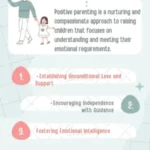Parenting is a journey filled with challenges and triumphs, and one approach that has gained significant attention in recent years is the concept of Unconditional Parenting. In this article, we will explore the foundations, practical applications, and long-term impact of this technique, debunking myths and sharing real-life success stories.
I. Introduction
Definition of Unconditional Parenting
Unconditional parenting is a philosophy centered on love and acceptance without conditions or expectations. It emphasizes building a strong parent-child bond based on trust, empathy, and understanding.
Importance of Parenting Techniques
Effective parenting techniques play a pivotal role in shaping a child’s character, influencing their emotional well-being and behavior throughout their lives.
II. The Foundation of Unconditional Parenting
Building Trust and Connection
At the core of unconditional parenting is the establishment of trust and a deep emotional connection. This involves active listening, empathy, and providing a secure emotional space for the child.
Rejecting Conditional Love
Unconditional parenting rejects the notion of love being contingent on a child’s achievements. Instead, it focuses on loving the child for who they are, fostering a sense of security and self-worth.
III. Practical Applications of Unconditional Parenting
Positive Reinforcement
Unconditional parenting encourages positive reinforcement, praising efforts rather than just outcomes. This helps children develop a healthy sense of self-esteem and intrinsic motivation.
Encouraging Independence
By allowing children to make choices and learn from their mistakes, unconditional parenting fosters independence and critical thinking skills, preparing them for the challenges of adulthood.
Embracing Mistakes as Learning Opportunities
Rather than punishing mistakes, unconditional parenting views them as valuable learning opportunities. This approach helps children develop resilience and a growth mindset.
IV. Common Misconceptions About Unconditional Parenting
Addressing Criticisms
Unconditional parenting often faces criticism for being too permissive. We address these concerns and emphasize that it does not mean an absence of boundaries but rather a focus on understanding and communication.
Clarifying Myths
We dispel common myths surrounding unconditional parenting, providing a clear understanding of its principles and debunking misconceptions.
V. Success Stories: Real-Life Examples
Testimonials and Experiences
Real-life success stories from families practicing unconditional parenting offer insights into the positive outcomes and strengthened parent-child relationships.
Demonstrating the Efficacy of Unconditional Parenting
We present concrete examples demonstrating how unconditional parenting contributes to a child’s emotional well-being and overall development.
VI. Challenges and How to Overcome Them
Patience and Consistency
Challenges may arise in implementing unconditional parenting, particularly in terms of patience and consistency. We provide practical tips for overcoming these challenges.
Dealing with Societal Pressures
Navigating societal expectations can be a hurdle. We offer guidance on dealing with external pressures while staying true to the principles of unconditional parenting.
VII. The Long-Term Impact of Unconditional Parenting
Building Resilient Adults
Unconditional parenting lays the foundation for raising resilient, emotionally intelligent adults capable of navigating life’s challenges with confidence.
Contributing to Emotional Well-being
We explore how the positive emotional bonds formed through unconditional parenting contribute to a child’s lifelong emotional well-being.
VIII. Conclusion
Recap of Unconditional Parenting
In conclusion, we recap the key principles of unconditional parenting and highlight its significance in nurturing healthy parent-child relationships.
Read also: Positive Parenting Solutions: Effective Strategies for Modern Parents





